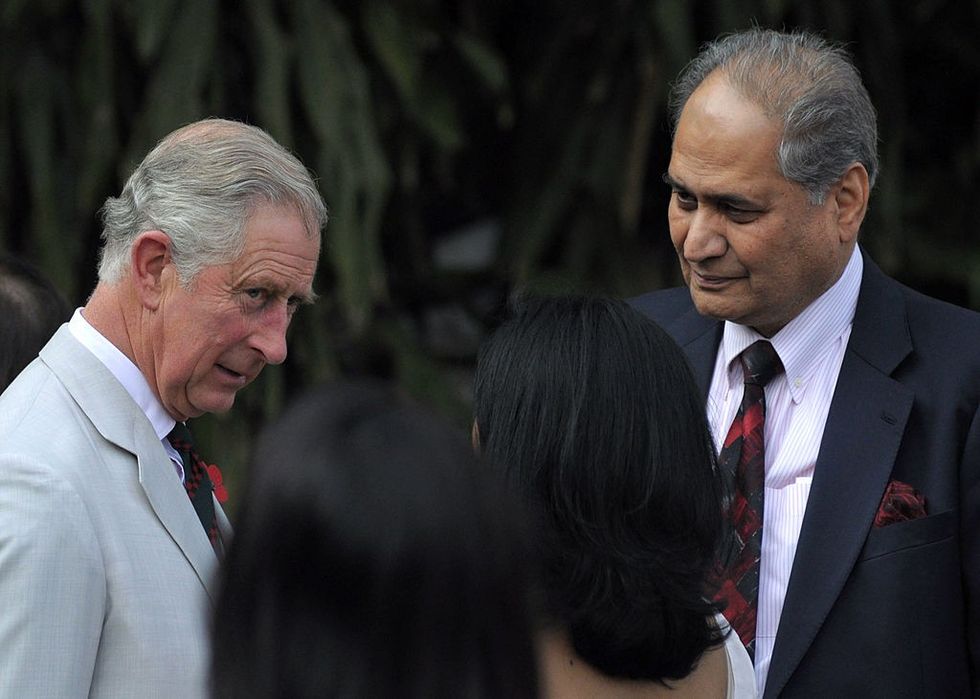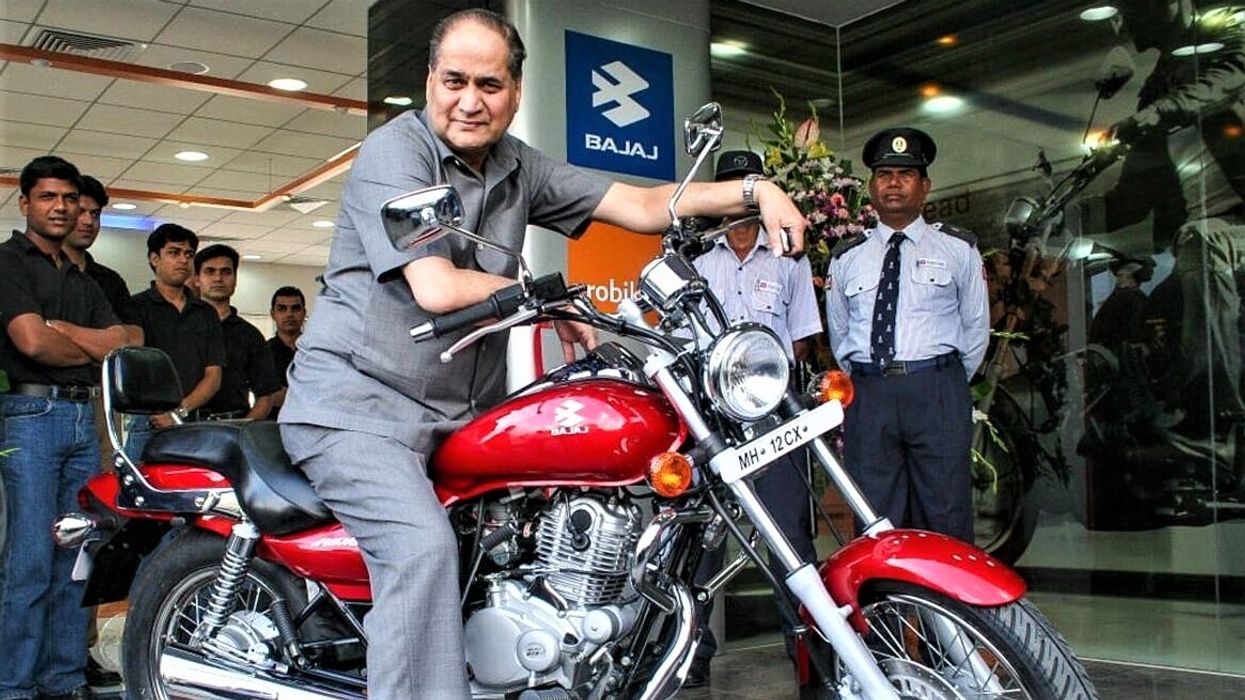INDIAN businessman Rahul Bajaj, who died in Pune last Saturday (12), aged 83, gave Lakshmi Mittal crucial support in 2006 when Mittal Steel’s takeover bid for Arcelor was almost blocked by the French government of president Jacques Chirac.
Bajaj, one of India’s most prominent industrialists, built up the family’s business in two-wheelers and three-wheelers.
He got India moving – literally.
“During the 1980s and 1990s, Bajaj two-wheelers, especially the Bajaj Chetak, were a common sight on most Indian roads. It was the most used mode for daily commutes of middle class and even for romantic spin by young couples,” a report in an Indian newspaper pointed out.
It added: “It was in 1989 that the ‘Hamara Bajaj’ jingle was used to advertise the automobile and the same instantly captured the imagination of pre-cable TV Indian minds, attaining iconic status.”
Bajaj is survived by two sons, Rajiv and Sanjiv Bajaj, and a daughter, Sunaina Kejriwal.
Born on June 10, 1938 in Calcutta (now Kolkata), he graduated with an honours degree in economics from St Stephen’s College, Delhi, in 1958. He also had a degree in law from Bombay University and an MBA from the Harvard Business School.
Bajaj sent shock waves in November 2019 when he slammed the government of India’s prime minister Narendra Modi for stifling criticism and creating a climate of fear — a sideswipe made in the presence of home minister Amit Shah, finance minister Nirmala Sitharaman and commerce minister Piyush Goyal.
Bajaj famously said: “We are afraid.... This atmosphere is definitely on our minds, but nobody will talk about it…I will say that openly. But a better reply has to come, not only a denial…. An environment has to be created. A clean environment is very important.”
Nevertheless, Modi tweeted his condolences on Bajaj’s passing: “Rahul Bajaj-ji will be remembered for his noteworthy contributions to the world of commerce and industry. Beyond business, he was passionate about community service and was a great conversationalist. Pained by his demise. Condolences to his family and friends. Om Shanti.”
Bajaj once said: “I was born anti-establishment… it’s very difficult for me to praise anybody.”
However, he gave crucial support to Mittal at a critical juncture in January 2006.
At the time, Mittal Steel, a Rotterdam-registered firm, had made a hostile and audacious bid for Arcelor, a French dominated company.
But many of the barbs aimed at Mittal were blatantly racist in character. Arcelor chief Guy Dollé said his company produced “perfume”, while Mittal merely made “eau-de-cologne”. He also did not want the Indian’s “monkey money”.
India’s commerce minister at the time, Kamal Nath, was in London at the end of January 2006 for talks with his British opposite number.
Bajaj was in the UK with Nath as part of the Indian delegation which attended the World Economic Forum in Davos.
Bajaj was the first Indian heavyweight to come out in support of Mittal at a time it was by no means certain the latter would overcome opposition from the French government.
Arcelor, which was bigger than Mittal Steel, had 30,000 employees in France, where a campaign was launched on the grounds Mittal Steel was owned by a “predator” Indian.
In an exclusive interview, Bajaj swung Indian opinion behind Mittal. What was also fortuitous was that Chirac was due to visit India on February 20 and 21 for talks with Dr Manmohan Singh, then India’s prime minister. It was made clear that France could win more business by not blocking Mittal.
After a meeting of the Commonwealth Business Council, Bajaj told me: “If it (Mittal’s bid) does not infringe anti-trust legislation in the EU, then I don’t see any reason why this offer should not go through if the shareholders at Arcelor accept it. If the shareholders don’t accept it, nobody comes into the picture. But the government of France or the EU should not come in the way if there is not anti-competition (involved).”
The consumer might benefit from such a deal, said Bajaj. “I could get cheaper steel. I buy a huge amount of steel.”
He pointed out: “I make 2.2 million two-wheelers and three-wheelers every year – motorcycles and motor scooters and three-wheelers. I want consolidation of the steel industry. If for parochial and narrow nationalistic reasons, it is rejected and not approved under some guise of anti-trust, it will be a shame for those who do that.”
Bajaj said of Mittal: “He has no business in India. His family has a business. He’s a good friend of mine. He may have bought a £70m house – he may have done this, he may have done that. I do not necessarily approve of everything he may have done. That’s not the point. But he holds that Indian passport, even though for the last 30 years he is out of India. He can easily get a British passport – every joker has got it.”
Bajaj added: “I am the only Indian on the international advisory committee of the New York Stock Exchange. I am on the World Economic Forum’s international advisory council – I was its co-chairman. I am the only Indian on the Prince of Wales’s International Business Leaders’ Forum. I am all for globalisation. I was told for a long time I was in the Bombay Club earlier and I was protectionist.”
Bajaj did not want India to retaliate if the French blocked Mittal. “If they (the French) make a stupid mistake, I do not want my government to make a similar mistake. That would be childish. But, yes, my feeling would be, the Indian people’s feeling would be very anti-French government.”

Bajaj added: “Though I am not a steel man, I am chairman of a (relatively) small steel company in India, Mukund Steel, and I consume a lot of steel and I make a lot of steel, but I don’t make flat products, I make round products. I make special alloy steel for the automotive industry.”
Explaining why he supported Mittal, Bajaj said: “Apart from my sentimental and emotional reasons why I fully support this deal, I believe in totality. With any such huge deals, there are downsides; there have to be downsides. Life is one of balance. You can’t have everything which is only good. There is very little which is all bad. In totality I hope this deal goes through and I believe in totality it will be good for the world. There will be other steel companies that will (also) consolidate.”
He drew attention to what was happening in India in the cement sector, for example. “Holcim (of Switzerland) has taken over ACC in India. It is now taking over Gujarat Ambuja. So one huge group will be (headed by) Kumarmangalam Birla and one group will be Holcim. In all these deals, there is a positive side and there is a negative side.”
He concluded: “If Mr Mittal succeeds and, in the next two years, we find profiteering – dominant position being misused – I will be the first to say, ‘Break him.’ Like ATT was broken ages ago. I am for ‘customer should benefit’. And nations should benefit, not individual companies. Having said that unless companies make good profits you can’t go on in the long run.”
By the summer, Mittal did win and is today the biggest steel tycoon in the world.




